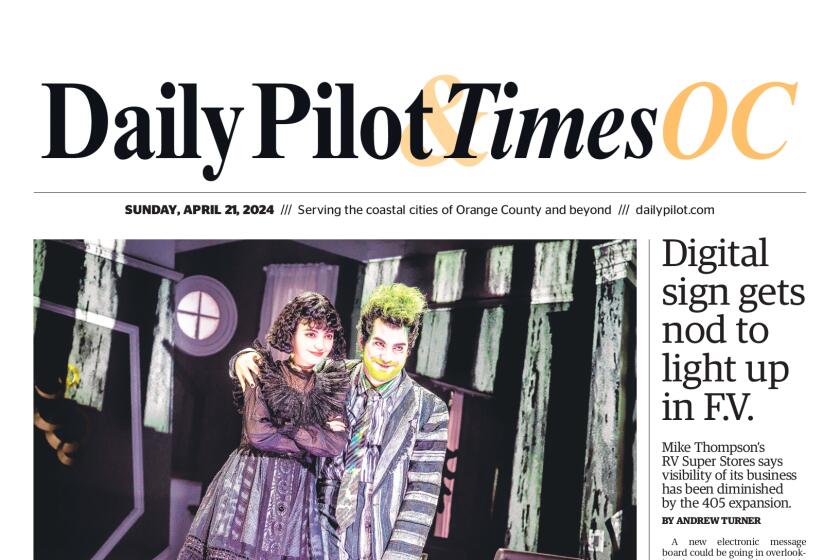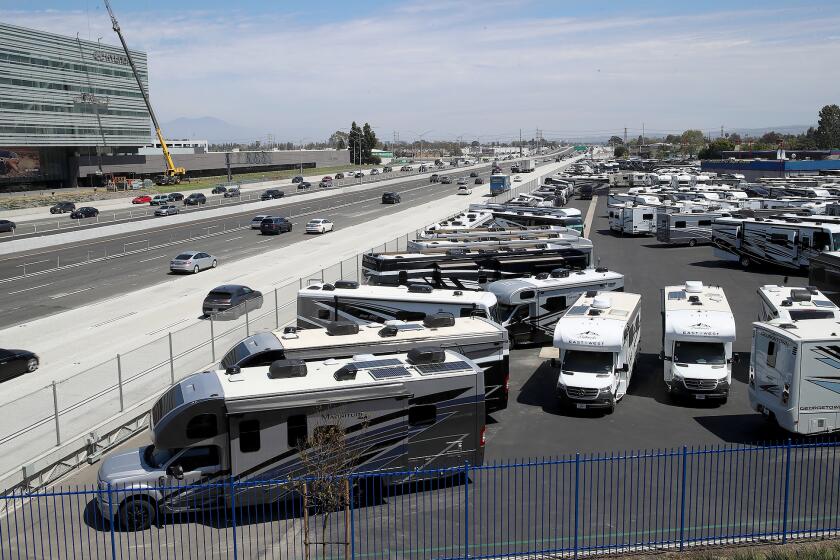Braving crocodiles, injuries
Tom Jones was paddling through a southeastern river this summer when he felt a sudden motion that nearly jerked him off his board. Instinctively, he hardened his stance and tightened his hands around the paddle, which, he quickly realized, a crocodile had ensnared in its teeth.
At that moment, Jones, who was paddling from Florida to New York to raise money to remove plastic from the ocean, realized his fate was out of his hands. He had already put up with 100-degree heat and horseflies in the first days of his journey, and now, for a moment, everything came down to two possibilities: Either the crocodile had bitten down on his paddle as a defensive move, or it wanted Jones for its next meal.
It turned out to be the former, as the animal, after nearly pulling Jones into the water, let go and swam away.
“That’s when you realize where you are on the food chain,” Jones said Monday in the living room of his Huntington Beach home, where he had spent the last two weeks recovering after paddling 1,507 straight miles.
Jones also tore some abdominal muscles midway through the May 12 to Aug. 12 trek, and had to wear compression shorts to contain the swelling. His fingers grew so blistered that he had to wrap duct tape around his gloves. Some days, he literally cried, cursed and recited the names of his wife and three children to give him the stamina to keep paddling.
But when it was all over, the 48-year-old didn’t want the focus to be on him. Even though his trip was certified by Standup Paddle Magazine as a world record for consecutive miles paddled, he still saw it as a means of spreading the word about pollution.
“They would say, ‘You’re crazy! Why would you do a thing like that?’” Jones said. “And then I’d have 15 seconds of their attention.”
*
‘Bit by bit, we make it’
Three years ago, his nonprofit, Tom Jones Foundation, launched a campaign called Plastic Free Ocean to fight plastic in the water — a problem Jones believes to be the single biggest threat to humans and the environment. The goal of Jones’ latest journey, titled the Wyndham Green Paddle 2010 and sponsored by Wyndham Worldwide and other corporations, was to raise $500,000 to help remove plastic from the ocean.
For his trip, Jones hired a three-person crew to cook, give him massages and drive his 34-foot motor home, where he spent the night after paddling each day. Some of the crew’s greatest difficulties came from finding a place to launch the motorboat that tracked Jones in the water; the crew used Google Earth to find ramps, and sometimes had to look again when the ramps turned out to be blocked.
Jones, a retired Marine and seven-time Muay Thai kickboxing champion, has a history of pushing his body — and mind — to perform arduous tasks. He once ran 121 marathons on consecutive days to raise funds for Orangewood Children’s Foundation. In 2007, he paddled 1,250 miles from Oregon to Mexico to raise awareness about plastic pollution. His philosophy for undertaking a long challenge is simple: Forget about yesterday and tomorrow and focus entirely on the present.
Even with that mindset, though, Jones still felt like quitting more than once as he made his way up the Atlantic. Four times, his crew had to rescue him when the waves nearly pulled him into rocks. He fell off his board multiple times and paddled near sharks, water moccasins and other predatory creatures.
During some of the lean times, Jones repeated to himself words that his friend and mentor, Laird Hamilton, had texted him early in the trip: “Bit by bit, we make it.”
In the end, the paddle raised about one-third of Jones’ goal. He attributes that to the recent BP oil spill, which he said sapped donations and media attention. Andy Glass, the executive director of the Tom Jones Foundation, said the group will continue its fundraising activities to reach $500,000, which it intends to use to build two boats that would skim plastic from waterways and tidal zones and bring it in to be recycled.
“We’re dealing with a massive, worldwide problem,” Glass said. “There’s not a simple 1-2-3 approach to this.”
*
Once more around Manhattan
Even while his body ached, though, Jones never lost sight of the reason for his journey — literally.
Plastic, in the form of bags and other trash, floated constantly in the ocean and in the Intracoastal Waterway, a stretch of rivers, bays and sounds where he spent about half of his journey. When Jones could, he fished out pieces with his paddle and had his crew bring them back to shore, where they deposited them in recycling bins. He often paddled in the mornings and returned to land in the afternoons to give speeches about ocean pollution.
To the Surfers’ Environmental Alliance, a grass-roots group dedicated to protecting of the ocean, Jones was an easy choice for the 2010 Waterman of the Year Award. The organization presented Jones with the award — a trophy made from the top third of a surfboard — shortly after he landed in New York.
“I know where I live, on the beach in New Jersey, plastic is everywhere,” said Executive Director Andrew Mencinsky. “The problem with plastics is that once they enter the marine environment, they don’t break down. It’s an inorganic substance. They turn into smaller and smaller pieces, which end up impacting the environment.”
By the time Jones reached New York, he felt ready to stop, but he had one obligation ahead of him. The Surfers’ Environmental Alliance puts on a benefit paddle around Manhattan every year, with half the funds going to its own programs and the other half going to charity, and Jones logged 28 more miles as one of the celebrity guests.
Upon returning to Huntington Beach, Jones, who also won a trophy from Standup Paddle Magazine for his efforts, got the reward he had most coveted since May: seeing his wife and children again. His goal right now is to be a homebody; he plans to open a martial-arts studio for special-needs children and combine it with a small paddleboard shop. His own paddle, for the time being, will stay in his garage.
“I’m always up for another endurance challenge,” Jones said. “It just has to be very worth my time at this point.”
By The numbers
1,507 miles92 days on the water
16.7 miles average per day
3.5 mph average speed
4 times rescued from water
$160,000 raised to clean plastic from the ocean
How To Help
To contribute to Jones’ cause, visit https://www.plasticfreeocean.orgAll the latest on Orange County from Orange County.
Get our free TimesOC newsletter.
You may occasionally receive promotional content from the Daily Pilot.



